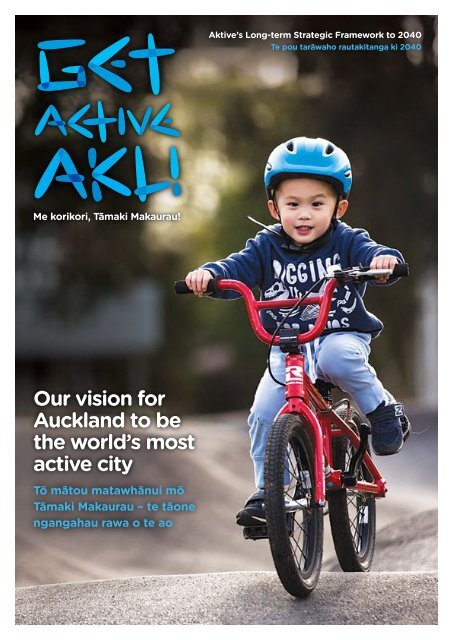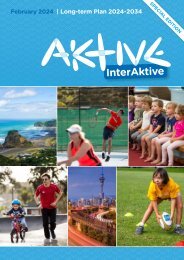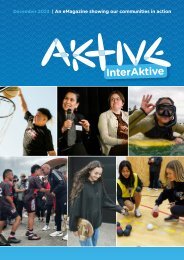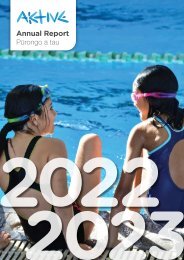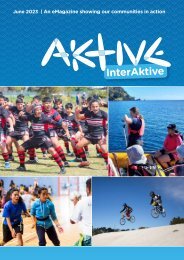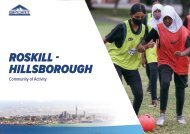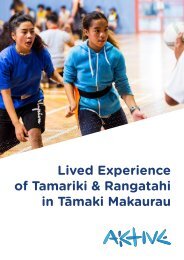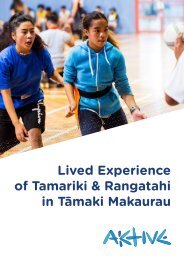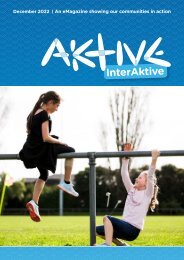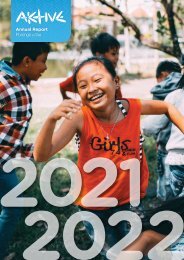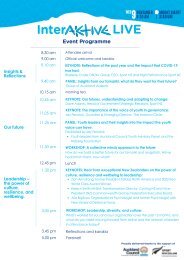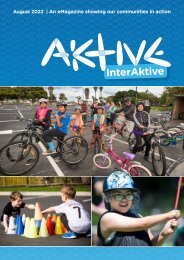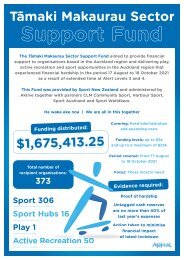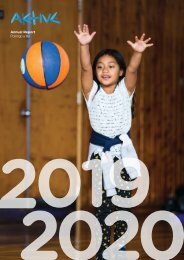Aktive's Strategic Framework 2020-2040
Create successful ePaper yourself
Turn your PDF publications into a flip-book with our unique Google optimized e-Paper software.
Aktive’s Long-term <strong>Strategic</strong> <strong>Framework</strong> to <strong>2040</strong><br />
Te pou tarāwaho rautakitanga ki <strong>2040</strong><br />
Me korikori, Tāmaki Makaurau!<br />
Our vision for<br />
Auckland to be<br />
the world’s most<br />
active city<br />
Tō mātou matawhānui mō<br />
Tāmaki Makaurau – te tāone<br />
ngangahau rawa o te ao
Auckland<br />
Tāmaki Makaurau<br />
The world’s most active city<br />
Te tāone ngangahau rawa o te ao<br />
Our vision is for Auckland to be the world’s<br />
most active city. This is founded in our belief<br />
that everyone has the right to an active life,<br />
free from barriers that limit access to and<br />
participation in sport, play and active recreation.<br />
The evidence is clear that being<br />
physically active has a positive effect<br />
on society, improving the wellbeing<br />
of people and communities and<br />
contributing to the hauora (health<br />
and wellbeing) of our young people.<br />
Participation in sport, play and active<br />
recreation leads to:<br />
• Healthier bodies: Improved<br />
individual and community health<br />
• Healthier minds: Improved<br />
educational achievement and<br />
mental wellbeing<br />
• Stronger communities:<br />
Increased social connection and<br />
enhanced community wellbeing<br />
• A stronger economy:<br />
More productive employees and<br />
economic benefits from a strong<br />
sport and active recreation sector.<br />
Auckland is a great place to live,<br />
work and play. It’s one of the world’s<br />
most liveable cities and is a place<br />
where people have a wide variety of<br />
opportunities to be physically active<br />
as part of daily life. With its beaches,
parks and ranges, sports facilities<br />
and community halls, walking and<br />
cycleways, Auckland has some great<br />
spaces for sport, play and active<br />
recreational activity.<br />
Aucklanders value being active. The<br />
majority participate in some form of<br />
physical activity in any given week,<br />
whether through involvement in<br />
organised sport, going to the gym,<br />
swimming, cycling, or going for a<br />
walk. This is supported by a wellestablished<br />
sport and recreation<br />
sector, which in turn is supported by<br />
more than 300,000 volunteers.<br />
However, the ways in which<br />
Aucklanders participate in sport,<br />
play and active recreation are<br />
changing. Auckland faces challenges<br />
between now and <strong>2040</strong> that could<br />
reduce people’s physical activity levels<br />
and have a negative impact on their<br />
health, including:<br />
• Unmet sport and active recreation<br />
needs from a changing population<br />
(a more ethnically diverse and<br />
a growing younger and older<br />
population)<br />
• A fast-growing city, placing further<br />
pressure on sport and recreation<br />
infrastructure<br />
• Growing income disparities, making<br />
it more difficult for some people to<br />
access sport and active recreation<br />
opportunities<br />
• Changing technology influencing<br />
how people engage in sport and<br />
active recreation<br />
• Rising obesity levels adversely<br />
affecting participation<br />
• Environmental change adversely<br />
affecting outdoor sport and active<br />
recreation, and<br />
• Ongoing funding shortfalls and an<br />
associated failure to meet future<br />
demand.<br />
Some tough decisions will be<br />
needed on future investment into<br />
the sport and recreation sector.<br />
And although most Aucklanders are<br />
physically active in any given week,<br />
their levels of activity are below World<br />
Health Organisation (WHO) guidelines,<br />
with a significant proportion either<br />
underactive or inactive. Unless we<br />
work together to change this, we<br />
predict that 1.5 million Aucklanders<br />
will be underactive or inactive by <strong>2040</strong>.<br />
That’s more than the populations of<br />
Wellington, Christchurch, Hamilton,<br />
Dunedin, Invercargill and Tauranga<br />
combined. Of these, 480,000 will be<br />
inactive young Aucklanders (aged 17<br />
and under) who could fill Eden Park<br />
ten times over.<br />
These people are Aktive’s priority.<br />
We aim to strengthen Auckland’s<br />
sporting and recreational systems and<br />
environments so that these people<br />
lead more active lives through sport,<br />
play and active recreation.<br />
By looking up and looking long<br />
we hope to build the right kind of<br />
near-term expertise, strategies and<br />
initiatives so that we achieve the<br />
vision of Auckland being the world’s<br />
most active city.<br />
Aktive’s goal is for<br />
1.5 million<br />
more Aucklanders to be<br />
active by <strong>2040</strong>
What do<br />
we mean by<br />
sport, active<br />
recreation, play<br />
and physical<br />
activity?<br />
Sport, active recreation, play and<br />
physical activity mean different things<br />
to different people. We use these<br />
terms in the following way:<br />
Sport is physical activity in which<br />
an individual or team compete<br />
against each other for wellbeing and<br />
enjoyment.<br />
Active recreation is noncompetitive<br />
physical activity<br />
undertaken for lifestyle, wellbeing,<br />
health and enjoyment.<br />
Play means physical activity that is<br />
intrinsically motivated, freely chosen,<br />
for no outcome.<br />
Physical activity is any activity<br />
which involves bodily movement. This<br />
includes active recreation, sport, or play.
Our<br />
Purpose<br />
Tō mātou Take Matua<br />
Our purpose is to provide<br />
leadership to the Auckland region<br />
that encourages, enables and<br />
inspires Aucklanders to lead<br />
more active lives through sport<br />
and active recreation.
Our<br />
Values<br />
Ō Mātou Uara<br />
Our values reflect a<br />
sporting approach and<br />
our drive to achieve<br />
results for Aucklanders.<br />
Gutsy Kia maia<br />
We make transparent,<br />
bold decisions in pursuit<br />
of our vision for Auckland<br />
Te Tiriti o<br />
Waitangi<br />
Team up<br />
Kia tū takitini<br />
We succeed by trusting<br />
and playing to each other’s<br />
distinctive strengths<br />
Be on the front foot<br />
Kōkiri whakamua<br />
We take the initiative, adapt<br />
quickly to change, and keep<br />
an eye on the horizon<br />
Go hard Kia kaha<br />
We work relentlessly,<br />
persevere, and see<br />
things through<br />
Play it straight<br />
Kia tākaro tōtika<br />
We deal with the facts,<br />
focus on solutions,<br />
and treat everyone<br />
fairly and with integrity<br />
Treaty of Waitangi<br />
We are committed to Te Tiriti<br />
o Waitangi and proactively<br />
engage with and support the<br />
aspirations of Māori and iwi. We<br />
acknowledge mana whenua’s<br />
responsibility for kaitiakitanga.<br />
These commitments will be<br />
given effect through regular<br />
board review of our Tiriti o<br />
Waitangi Responsiveness Policy,<br />
advisory support through our<br />
Aktive Māori Advisory Group,<br />
and the specific “Partnering<br />
with Māori” strategic priority.
Aktive’s<br />
<strong>Strategic</strong><br />
Priorities<br />
Ngā whakaarotau<br />
rautakitanga o Aktive<br />
To achieve our vision,<br />
we will focus on seven equally<br />
important strategic priorities<br />
Leading the<br />
conversation<br />
Kia arahi i<br />
ngā wānanga<br />
kōrero<br />
Together<br />
we go further<br />
Kia koke i roto<br />
i te kōtuitanga<br />
2<br />
Anywhere,<br />
anytime activity<br />
Kia kori tinana, ahakoa te<br />
wā, ahakoa te wāhi<br />
7 3<br />
6<br />
1<br />
Underactive<br />
Aucklanders<br />
are more active<br />
Kia kaha ake te kori tinana<br />
a ngā tāngata kāore i te<br />
kaha ki te kori tinana<br />
5<br />
Partnering<br />
with Māori<br />
Kia mahi tahi<br />
me te Māori<br />
Great spaces<br />
and places<br />
He tūhoropaki<br />
me ngā tūwāhi<br />
tino pai<br />
4<br />
Keeping pace<br />
with a changing<br />
Auckland<br />
Kia oma tahi<br />
me te panoni<br />
haeretanga o<br />
Tāmaki
We think<br />
locally<br />
and act<br />
regionally<br />
What we do:<br />
Aktive has the following roles in<br />
making these strategic priorities<br />
happen:<br />
Leading: Setting clear direction,<br />
challenging the status quo<br />
and driving positive change for<br />
the people and whānau of<br />
Auckland<br />
Bringing strategy to life:<br />
Setting regional priorities and<br />
plans; incubating initiatives with<br />
participants and partners; funding<br />
and empowering others to deliver<br />
community activities<br />
Advocating: Championing<br />
the sport, active recreation, play<br />
and physical activity rights of<br />
Aucklanders<br />
Catalysing Best Practice:<br />
Creating co-operation and alignment<br />
across the sector; empowering other<br />
organisations by providing advice,<br />
insights and resources so that they<br />
can lead their own transformation<br />
and change.<br />
How we work:<br />
• We listen to the people, whānau,<br />
families and organisations of<br />
Auckland and are responsive to<br />
their needs.<br />
• We put priority participants at the<br />
centre and focus on age- and<br />
stage-appropriate activity.<br />
• We collaborate in a way which<br />
respects our partners and<br />
empowers communities.<br />
• We take an evidence- and<br />
insights-based approach with<br />
transparent decision-making.<br />
• We make things happen and<br />
undertake comprehensive<br />
monitoring and evaluation.<br />
• We are committed to the<br />
continuous building of Auckland’s<br />
sport and recreation system.<br />
• We work with existing and<br />
emerging organisations with<br />
aligned values and a shared<br />
commitment to make a difference.<br />
We think<br />
regionally<br />
and act<br />
locally
Underactive Aucklanders<br />
are more active<br />
Kia kaha ake te kori tinana a ngā tāngata<br />
1kāore i te kaha ki te kori tinana<br />
It is our belief that every<br />
Aucklander has the right to hauora<br />
(health and wellbeing) through<br />
physical activity as part of their<br />
daily lives. Participating in sport, play<br />
and active recreation builds social<br />
and community connection and<br />
improves physical and mental health.<br />
However, there are many barriers to<br />
leading an active life, including:<br />
• The cost of access or membership<br />
• The location of sport and recreation<br />
facilities and transport links to them<br />
• The design of some facilities<br />
• The hours of operation<br />
• Cultural issues, including cultural<br />
safety<br />
• Personal aspects such as<br />
confidence and self-esteem.<br />
makeup of Auckland’s population and<br />
areas of need change, there are some<br />
enduring areas of focus for Aktive:<br />
• Increasing the activity levels of<br />
Auckland’s young people is a<br />
specific priority area.<br />
• Increasing activity amongst Māori<br />
and Pacific people, and their<br />
ownership of sport, play and active<br />
recreation is also a focus. While<br />
they make a significant contribution<br />
to Auckland’s and New Zealand’s<br />
sporting success, participation<br />
rates are reducing. Working with<br />
these communities, we are looking<br />
for ways to increase participation<br />
and governance leadership,<br />
recognising the role that sport plays<br />
as an enabler for success and<br />
wellbeing.<br />
The evidence is that these barriers<br />
make participation in sport, play<br />
and active recreation more difficult<br />
for Māori, Pacific and Asian<br />
peoples, women and girls, people<br />
with disabilities, older people, and<br />
the rainbow community (LGBTQ).<br />
Participation by young people is<br />
adversely affected by these factors.<br />
While our priority areas will change<br />
between now and <strong>2040</strong> as the<br />
We will work with our partners<br />
to break down the barriers<br />
experienced by some of Auckland’s<br />
communities, encourage<br />
participation by those who are<br />
currently underactive or inactive,<br />
and create a more inclusive and<br />
welcoming environment for all.<br />
In doing this though, we must<br />
also continue to support those<br />
Aucklanders who are currently active.<br />
Goal<br />
Participation in sport, play and active recreation by currently underactive or<br />
inactive Aucklanders is increased.<br />
Aktive’s Role<br />
Leading<br />
Bringing<br />
Strategy to life<br />
Advocating<br />
Catalysing<br />
Best Practice<br />
Key <strong>Strategic</strong><br />
Initiatives<br />
• Set regional strategy and establish regional priorities, work programmes and<br />
budgets that focus on increasing participation by priority populations in sport,<br />
play and active recreation.<br />
• Empower organisations to develop and deliver activities, services and<br />
initiatives which remove barriers to participation in sport, active recreation,<br />
play and physical activity.<br />
Outcome<br />
Auckland adults are the most active in the world by <strong>2040</strong> (WHO)<br />
Auckland young people (5-17) are the most active in the country by <strong>2040</strong>
Anywhere,<br />
anytime activity<br />
Kia kori tinana, ahakoa<br />
2te wā, ahakoa te wāhi<br />
Tāmaki Makaurau is a multicultural<br />
city, with over 120 different<br />
ethnicities. It is also a changing city.<br />
For example, by <strong>2040</strong>, over one-third<br />
of the city’s population will identify as<br />
Asian. Whilst Auckland’s population<br />
will be older (with almost twice as<br />
many people aged over 65 years than<br />
under 25 years) it will still be a youthful<br />
city. Among the Māori and Pacific<br />
populations, over half will be under the<br />
age of 25. Many of these young people<br />
will live in South Auckland. Auckland’s<br />
increasingly diverse communities will<br />
require very different sport, play and<br />
active recreation options. There needs<br />
to be much greater flexibility and<br />
choice available if we are to encourage<br />
individual Aucklanders to become<br />
more physically active.<br />
the coming years we can expect to<br />
see a greater blending of technology<br />
with sport, play and active recreation<br />
through, for example, virtual reality.<br />
While technology is often seen as a<br />
threat to activity levels, particularly<br />
for younger Aucklanders, it may also<br />
provide a real opportunity to stimulate<br />
physical activity.<br />
Sport, play and active recreation will<br />
continue to compete for people’s<br />
time and money in a changing<br />
market. Work and lifestyle changes,<br />
such as flexible and remote working<br />
arrangements, also mean that people<br />
want to access sport, play and<br />
active recreation opportunities more<br />
informally, in different locations, and<br />
at times that suit them.<br />
Other changes will also drive the need<br />
for greater flexibility and choice in<br />
the sector. Advances in technology<br />
will significantly alter the ways all<br />
Aucklanders play, work and interact<br />
with each other. Technological<br />
advances will continue to change<br />
not only how people engage with<br />
and want to experience sport, play<br />
and active recreation, but also what<br />
people view as physical activity. Over<br />
While traditional types of sport and<br />
active recreation will continue to have<br />
a place in Auckland, the changing<br />
nature of our society will see an<br />
ongoing shift in the way Aucklanders<br />
choose to be physically active. We<br />
must continually challenge ourselves<br />
and the organisations we work with<br />
to deliver a diverse range of sport and<br />
active recreational activities in a wide<br />
range of places and times.<br />
Goal<br />
All Aucklanders have sport, play and active recreation choice, which provides<br />
flexibility, meets the needs of a changing population, and encourages physical<br />
activity as part of daily life.<br />
Aktive’s Role<br />
Leading<br />
Bringing<br />
Strategy to life<br />
Advocating<br />
Catalysing<br />
Best Practice<br />
Key <strong>Strategic</strong><br />
Initiatives<br />
• Drive flexible opportunities for physical activity through formal and informal<br />
sport, active recreation and play, that are culturally appropriate, affordable and<br />
in diverse settings.<br />
• Champion the flexible use of existing and new facilities and infrastructure.<br />
• Encourage the innovative use of technology to encourage and motivate<br />
people to participate.<br />
Outcome<br />
Aucklanders agree they have the opportunity to be physically active in ways that<br />
meet their preferences.
Great spaces<br />
and places<br />
He tūhoropaki me<br />
3ngā tūwāhi tino pai<br />
Tāmaki Makaurau’s population is<br />
expected to grow from 1.66m people<br />
in 2018 to 2.2m people in <strong>2040</strong>.<br />
This growth will increase demand<br />
for housing, schools, infrastructure<br />
and services. Population growth has<br />
already resulted in gaps in Auckland’s<br />
existing network of community sport<br />
and recreational facilities, particularly<br />
in the areas of higher socio-economic<br />
disadvantage. Predicted future<br />
growth will heighten the pressure on<br />
existing facilities and increase the<br />
demand for new facilities.<br />
The impacts of growth are not evenly<br />
felt across Auckland’s population. It is<br />
already harder for communities with<br />
the lowest incomes to gain access<br />
to sport and recreation facilities and<br />
services. As a consequence, their<br />
participation and activity levels suffer.<br />
This is set to get worse, as further<br />
population growth puts even more<br />
pressure on existing facilities.<br />
Population growth has other less<br />
obvious impacts on participation in<br />
sport, play and active recreation. For<br />
example, it continues to increase<br />
congestion on Auckland’s road<br />
network, meaning people spend<br />
more time sitting in traffic. As well,<br />
the public transport network does<br />
not always help people get to the<br />
places they need to be. These<br />
transport challenges make it harder<br />
for people to access their chosen<br />
facilities and activities.<br />
Auckland’s population growth requires:<br />
• Greater investment in multipurpose<br />
sport and recreational<br />
facilities, particularly in areas where<br />
need (including socio-economic<br />
need) is evident as well as suburbs<br />
where new housing developments<br />
and schools are planned facilities<br />
that are easy and safe to access<br />
• Well-designed and easilyaccessible<br />
parks and active<br />
recreation spaces as part of all new<br />
residential developments<br />
• Opening of existing single-use<br />
facilities up to multi-purpose,<br />
community use<br />
• Opening of school sport and active<br />
recreation facilities up to greater<br />
community use, and<br />
• A greater focus on active transport<br />
(walk, bike, scoot and skate) as<br />
a way to not only respond to<br />
congestion, but also to incorporate<br />
physical activity into daily life.<br />
Goal<br />
Planning, urban design and infrastructure investment delivers safe, flexible, and<br />
easy-to-access sport, play and active recreation environments.<br />
Aktive’s Role<br />
Leading<br />
Bringing<br />
Strategy to life<br />
Advocating<br />
Catalysing<br />
Best Practice<br />
Key <strong>Strategic</strong><br />
Initiatives<br />
• Challenge all relevant public and private agencies to deliver well-planned, safe,<br />
and easily accessible regional and local parks, active recreation and activity<br />
spaces as part of all new developments.<br />
• Advocate for operationally-affordable and flexible multi-use facilities in all areas<br />
of highest need.<br />
• Champion the shared use of facilities and active recreational spaces,<br />
particularly when not needed for their primary use or purpose<br />
Outcome<br />
Auckland has excellent levels of fit for purpose sport and recreation facilities,<br />
parks and open spaces.
Keeping pace with<br />
a changing Auckland<br />
Kia oma tahi me te panoni<br />
4haeretanga o Tāmaki<br />
A fast-changing world challenges<br />
Aktive and Auckland’s sport and<br />
recreation sector to keep pace<br />
and adapt. We can’t predict with<br />
any great certainty the changes that<br />
we will face between now and <strong>2040</strong>.<br />
However, some of the broad<br />
changes we will all need to<br />
respond to are known and can,<br />
to some extent, be planned for.<br />
The types of changes facing the<br />
sector are:<br />
Technological innovations:<br />
These will significantly change the<br />
way services are delivered and the<br />
types of jobs available within the<br />
sector.<br />
Environmental change:<br />
Climate change will affect the<br />
ability to provide suitable facilities<br />
in Auckland and access to some<br />
sport and active recreational<br />
activities. Changing environmental<br />
values and behaviours will require<br />
organisations to put sustainability<br />
at the core of their governance<br />
and operation.<br />
Political change: These bring<br />
shifts in priorities, including how<br />
funding is allocated. Shortfalls in<br />
public sector and gaming funding<br />
will continue, placing pressure on<br />
organisations to find alternative<br />
sustainable funding sources.<br />
Population change:<br />
Organisations will need to<br />
understand, include and be<br />
connected to the changing nature<br />
of the communities that they<br />
represent and are trying to reach.<br />
This will require greater cultural<br />
knowledge and confidence.<br />
Workforce changes: By <strong>2040</strong><br />
the ethnic and cultural composition<br />
of Auckland will be very different.<br />
For example, one-third of<br />
Aucklanders will identify as Asian.<br />
It will be challenging to develop a<br />
workforce that is representative<br />
and reflective of this diversity. This<br />
is a particular issue for those<br />
communities where a career within<br />
the sport and recreation sector is<br />
not seen as attractive.<br />
Goal<br />
Sport and recreation organisations are representative of and relevant to<br />
Auckland’s communities and can adapt to change.<br />
Aktive’s Role<br />
Leading<br />
Advocating<br />
Catalysing<br />
Best Practice<br />
Key <strong>Strategic</strong><br />
Initiatives<br />
• Empower Auckland’s sport and recreation organisations to be reflective of<br />
their communities at the governance, management and coaching levels.<br />
• Catalyse workforce development programmes that will generate a sport and<br />
recreation workforce in <strong>2040</strong> that is representative of Auckland’s diverse<br />
communities.<br />
• Drive the sharing of knowledge and resources and the collection of relevant<br />
data within the sector to improve organisational agility, efficiency and<br />
effectiveness.<br />
Outcome<br />
• Sport and recreation organisations have diverse governance and workforces.<br />
• Sport and recreation organisations have adapted their delivery to Auckland’s<br />
communities.
Partnering<br />
with Māori<br />
Kia mahi tahi<br />
5me te Māori<br />
Aktive recognises the bi-cultural<br />
foundation to the multi-cultural city<br />
of Tāmaki Makaurau and that there<br />
are compelling reasons to support<br />
the aspirations of Māori and iwi.<br />
For Tāmaki Makaurau to be the<br />
world’s most active city, Māori<br />
must be active.<br />
Māori have a strong association with<br />
competitive sport in Auckland and<br />
make a major contribution to the<br />
region and the country’s sporting<br />
success. However, while slightly<br />
more Māori adults meet World<br />
Health Organisation (WHO) activity<br />
targets than other ethnicities, Māori<br />
participation rates are declining. Māori<br />
are also disproportionality represented<br />
in obesity statistics and are more<br />
likely to live in poorer households.<br />
This makes participating in sport, play<br />
and active recreation a challenge,<br />
particularly for young Māori.<br />
The capacity for Māori to impact<br />
Māori wellbeing is growing through,<br />
for example, the increasing political<br />
and economic influence of Tāmaki<br />
Makaurau’s iwi. Partnering with<br />
Māori to increase leadership and<br />
participation by and as Māori in<br />
sport, play and active recreation will<br />
address inequities created by ways<br />
of working that have too often placed<br />
Māori as recipients of services<br />
ather than leaders of their own<br />
culturally appropriate aspirations<br />
and development.<br />
We recognise the need for<br />
there to be lasting, reciprocal<br />
relationships between iwi and<br />
the sector and that initiatives<br />
aimed at improving hauora<br />
(health and wellbeing) through<br />
physical activity are based in<br />
Māori values and are culturally<br />
appropriate to Māori - as<br />
Māori, for Māori. This requires<br />
organisations to adopt kaupapa<br />
Māori approaches so that they can<br />
confidently engage with Māori, as<br />
well as embracing Māori involvement<br />
“as Māori” in leadership and<br />
decision-making.<br />
Goal<br />
Aktive’s Role<br />
Key <strong>Strategic</strong><br />
Initiatives<br />
Outcome<br />
The aspirations of Māori for increased participation and leadership “as Māori” in<br />
sport and active recreation are supported.<br />
Leading<br />
• Partner with Māori organisations to support sport, play and active recreation<br />
initiatives that meet Māori aspirations and outcomes.<br />
• Champion equitable access to resources in a way which supports Māori<br />
participating “as Māori”.<br />
• Inspire organisations within the sector to adopt kaupapa Māori approaches<br />
and to develop cultural competence so they can engage with confidence.<br />
• Tāmaki Makaurau Māori adults are the most active in the county by <strong>2040</strong>.<br />
• Tāmaki Makaurau Māori tamariki/rangatahi (5-17) are the most active in the<br />
country by <strong>2040</strong>.<br />
Bringing<br />
Strategy to life<br />
• Sport and recreation organisations have adopted kaupapa Māori approaches<br />
and developed cultural competence.<br />
Advocating<br />
Catalysing<br />
Best Practice
PHOTO: DSCRIBE MEDIA SERVICES<br />
Goal<br />
Aktive’s Role<br />
Key <strong>Strategic</strong><br />
Initiatives<br />
Outcome<br />
Together<br />
we go further<br />
Kia koke i roto<br />
6i te kōtuitanga<br />
Collaboration is fostered across public, private, not-for-profit, educational and<br />
sport and recreation organisations, drawing on their complementary roles in<br />
building a more active Auckland.<br />
Leading<br />
• Drive strategy, policy, resource and knowledge alignment between the<br />
sector’s many organisations and agencies.<br />
• Encourage organisations to co-design responses with priority communities.<br />
• Convene organisations within, across and outside the sector to share<br />
best practice and collaboratively develop sport, play and active recreation<br />
initiatives.<br />
Bringing<br />
Strategy to life<br />
Advocating<br />
• All organisations that have a role in sport, play and active recreation in<br />
Auckland have aligned goals to build a more active Auckland.<br />
Catalysing<br />
Best Practice<br />
If Auckland is to become the world’s<br />
most active city, we will need to find<br />
new ways to work together to inspire<br />
all Aucklanders to be physically<br />
active as a regular part of their daily<br />
lives. Aktive has a pivotal role to<br />
play in bringing a wide range<br />
of people, communities and<br />
organisations together, to develop<br />
new and shared ways of working<br />
and to create alignment across<br />
the sector.<br />
Developing true collaboration<br />
between a wide range of<br />
organisations requires a culture of<br />
inclusion, trust and respect, based<br />
on an understanding of the changing<br />
nature of Auckland and its<br />
communities. For example,<br />
strengthening our relationships with<br />
Pacific communities recognises that<br />
Auckland has the largest population<br />
of Pacific peoples of any city in the<br />
world. We also will need to<br />
strengthen our connections with<br />
Auckland’s fast-growing Asian<br />
population. We need to work<br />
collaboratively with all priority<br />
populations to understand their<br />
interests and perspectives and to<br />
empower them to develop and lead<br />
initiatives.<br />
We will work closely with the<br />
many public, private and communitybased<br />
organisations that have<br />
complementary roles to play in<br />
increasing participation in sport, play<br />
and active recreation in Tāmaki<br />
Makaurau, as well as encouraging<br />
Aucklanders to become more<br />
physically active. These include:<br />
• Sport New Zealand<br />
• Auckland Council and its agencies<br />
(such as Auckland Transport and<br />
Auckland Tourism, Events, and<br />
Economic Development)<br />
• Central government agencies<br />
(including the sport, education and<br />
health sectors)<br />
• Regional sports trusts<br />
• National and regional sporting<br />
organisations<br />
• Iwi/Māori and ethnic development<br />
organisations<br />
• Education providers (early<br />
childhood, schools, and tertiary<br />
providers)<br />
• Health providers<br />
• Community-based and not-forprofit<br />
organisations<br />
• Private sector sport and recreation<br />
organisations<br />
• Private corporations and<br />
workplaces.<br />
We will all have to work together<br />
to make the best use of our time,<br />
knowledge and resources, drawing<br />
on our complementary strengths<br />
to produce better outcomes.<br />
This could mean for example:<br />
• Working with schools to provide<br />
access to their sport and<br />
recreational facilities outside<br />
school hours<br />
• Working with corporates to be<br />
more expansive in the benefits<br />
they offer employees, such as gym<br />
memberships, sports leave for<br />
players and officials, funding of<br />
recreational activities, and<br />
encouraging walking and cycling<br />
as a part of the working day<br />
• Encouraging public and private<br />
organisations to leverage more<br />
opportunities for activity by being<br />
innovative in how they use their<br />
facilities<br />
• Sharing knowledge and ideas with<br />
the health sector on proven<br />
programmes and initiatives that<br />
encourage people to become<br />
more active.
Goal<br />
Aktive’s Role<br />
Key <strong>Strategic</strong><br />
Initiatives<br />
Leading the<br />
conversation<br />
Kia arahi i ngā<br />
7wānanga kōrero<br />
National and local decision-making agencies understand and are committed<br />
to the value of Auckland becoming the world’s most active city.<br />
• Lead and help shape the conversation on the mega-trends which will provide<br />
opportunities and threats to Auckland’s sport and active recreation sector.<br />
• Leverage insights, data and knowledge to build a compelling case for<br />
investment in Auckland’s sport and active recreation sector to keep pace with<br />
the needs of New Zealand’s largest city.<br />
• Champion the sport, play and active recreation needs of Aucklanders with<br />
central and local government decision-makers.<br />
• Inspire Aucklanders to be more active through campaigns that tell success<br />
stories.<br />
Leading<br />
Advocating<br />
Catalysing<br />
Best Practice<br />
Tāmaki Makaurau is facing a<br />
magnitude of change through to<br />
<strong>2040</strong> that will have far-reaching<br />
impacts on all Aucklanders. We<br />
must keep one step ahead of these<br />
changes if we are to maximise the<br />
opportunities they present, while<br />
minimising the inevitable impacts.<br />
Mega-trends such as increased<br />
diversity within our population,<br />
environmental change, and<br />
a growing focus on integrity<br />
and safety within the sport<br />
and recreation sector have the<br />
potential to significantly affect<br />
the activity levels of Aucklanders.<br />
We can’t wait to see the impact<br />
before we act. We must be<br />
proactive and constantly scan the<br />
horizon to make sure we anticipate<br />
the issues and trends, we talk about<br />
them, and we collaboratively develop<br />
solutions. In other words, we must<br />
help shape or even change the<br />
conversation.<br />
Sport, play and active recreation<br />
has the potential to connect<br />
people and promote social<br />
cohesion, understanding and<br />
tolerance. However, many people<br />
are not aware of the wide-ranging<br />
benefits and value that participation<br />
can bring to their lives. They may<br />
not feel inspired to become<br />
involved, or simply may not<br />
understand the options that are<br />
available to them.<br />
For Auckland to be the world’s<br />
most active city, a shift is required<br />
in people’s awareness, knowledge<br />
and behaviour. Being physically<br />
active must become the norm for<br />
Aucklanders. However, changing<br />
people’s behaviour is not easy. This<br />
is an ambitious goal. It requires a<br />
commitment by all national and local<br />
decision-makers to invest in making<br />
Auckland the world’s most active city.<br />
Aktive has a key role to play in<br />
shaping the conversation about the<br />
importance of sport, play and active<br />
recreation at multiple levels.<br />
• We will champion the needs of<br />
Aucklanders with all national and<br />
local decision-making agencies<br />
• We will gather, analyse and share<br />
insights and information to help<br />
change the conversation around the<br />
importance of being physically active<br />
• We will ensure all decision-making<br />
and investment is informed by<br />
robust data, and<br />
• We will inspire Aucklanders with<br />
success stories and relatable role<br />
models.<br />
We will also work with and encourage<br />
our partners to spread the message to<br />
the diverse communities of Auckland<br />
about the many benefits that come<br />
from being physically active through<br />
participating in sport and active<br />
recreation.<br />
Outcome<br />
• Aktive is a recognised and trusted advocate.<br />
• National and local government funding keeps pace with the investment<br />
needs of Auckland as New Zealand’s largest city.
Implementing<br />
our strategic<br />
framework<br />
Te whakatinanatanga o te pou tarāwaho<br />
Aktive is an independent charitable<br />
trust established to provide regional<br />
leadership in relation to sport and active<br />
recreation in Auckland. In doing so, we<br />
serve the people, whānau and sport and<br />
recreation organisations of Auckland.<br />
This is our long-term strategic<br />
framework. In developing it, we have<br />
focused on “looking up and looking<br />
long”. While it is designed to guide<br />
our long-term decisions and actions,<br />
it will not stand alone. To ensure<br />
we are successful, we will use this<br />
strategic framework to inform all<br />
aspects of our business planning<br />
and implementation.<br />
• It will drive the development of<br />
our more detailed short and<br />
medium-term planning and<br />
operational decision-making<br />
• It will underpin the Aktive Board’s<br />
governance oversight<br />
• It will inform decisions about<br />
organisational capabilities and<br />
resources<br />
• We will measure our success<br />
against the objectives and<br />
roles established in this<br />
strategic framework through<br />
the development of short- and<br />
medium-term key performance<br />
indicators, and<br />
• We will report against those<br />
success measures, consistent with<br />
our commitment to transparency.
Aktive’s <strong>Strategic</strong> Planning<br />
and Monitoring <strong>Framework</strong><br />
Te pou tarāwaho o te<br />
mahere me te pūrongo<br />
This framework will inform Aktive’s strategic plans, and annual plans, with associated reporting.<br />
Thank you to the following<br />
organisations and individuals for<br />
contributing to the development<br />
of this strategic framework<br />
<strong>Strategic</strong> Planning and Evaluation <strong>Framework</strong><br />
Auckland - the world’s most active city<br />
<strong>Strategic</strong> <strong>Framework</strong><br />
<strong>Strategic</strong> Plan<br />
Annual Plans<br />
<strong>Strategic</strong> Measures<br />
Population level change<br />
Impact Measures<br />
Behaviour and practice change<br />
Annual Measures<br />
Performance ‘Dashboard’<br />
Aktive Māori Advisory Group<br />
ATEED (Auckland Tourism, Events<br />
and Economic Development)<br />
Athletics New Zealand<br />
Auckland Council<br />
AUT Millennium<br />
Badminton New Zealand<br />
Basketball New Zealand<br />
Bruce Pulman Park<br />
CLM (Community Leisure Management)<br />
College Sport Auckland<br />
Cricket New Zealand<br />
Cycling New Zealand<br />
Drowning Prevention Auckland<br />
Dr Paul Spoonley, Massey University<br />
Dr Susan Morton, University of Auckland<br />
EMA (Employers and Manufacturers<br />
Association)<br />
Foundation North<br />
Gymnastics New Zealand<br />
Growing up in New Zealand<br />
Halberg Foundation<br />
Harbour Sport<br />
Healthy Auckland Together<br />
Healthy Families<br />
Hockey New Zealand<br />
Independent Māori Statutory Board<br />
Keven Mealamu<br />
Les Mills<br />
Manukau Urban Māori Authority<br />
Meeting and Governance Solutions<br />
Ministry of Education<br />
Ministry of Health<br />
Netball Northern<br />
Netball New Zealand<br />
New Zealand Football<br />
New Zealand Golf<br />
New Zealand Rugby League<br />
New Zealand Rugby Union<br />
New Zealand Community Trust<br />
Organised Sport Advisory Group<br />
The Southern Initiative<br />
Sport Auckland<br />
Sport New Zealand<br />
Sport Waitākere<br />
Stand Up Paddle Boarding<br />
Swimming New Zealand<br />
Tattico<br />
Te Whānau o Waipareira<br />
Toi Tangata<br />
Water Safety New Zealand<br />
WERO<br />
WISPA (Women in Sport Aotearoa)
Aktive works in partnership with<br />
CLM Community Sport, College Sport,<br />
Harbour Sport, Sport Auckland<br />
and Sport Waitākere.<br />
We gratefully acknowledge the support<br />
of Sport New Zealand, Auckland Council,<br />
Foundation North, the New Zealand<br />
Community Trust and the Lion Foundation.<br />
www.aktive.org.nz


